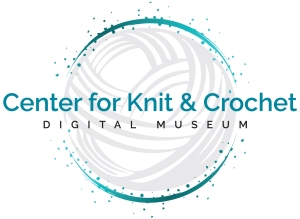Knitting/Not Knitting Can Be Beautiful
Why would a coroner’s inquest or the Census of the United States appear in CKC’s digital Library and Museum Collection? Turns out, they list people whose family names were Crochet, Knittel, Knitterscheid, and Knith; and a person whose first name was Knittie. The same goes for other lists of individuals in the archive.
Don’t even get me started on the number of close-knit communities in the archive, where no additional connection to the art of knitting is revealed. I call it knitting/not knitting, and it makes a cute social media post for Opposite Day.
This sort of thing happens in any cataloging system, where words don’t always mean what you want them to mean.
However, sometimes knitting/not knitting is beautiful: here is an excerpt from the oral history of World War II veteran, Dr. Elbert Parr Tuttle, Jr. (1921-2012), interviewed July 12, 2004 by David Lowance. It is poignant, perfect for this time, and probably for all time.
INTERVIEWER: We’ve got a few more minutes, is there anything that you’d like to be remembered for in terms of your World War II experience, or your father’s or family’s that you’d like to say to future generations?
ELBERT TUTTLE: Well, I think we need to look carefully with the morals and ethics that we grow up with to try to understand who we are and what we can do with our lives that are constructive.
There are some people who seem to just spend their whole time tearing things down and being in opposition to one thing or another, and to acting in a way that creates chaos instead of order. Now there are many different ways in which you can contribute to order and the fitting together of this whole network of humanity, and if the quilt that you are knitting together gets frayed you’ve got to sew up the connections between the little squares. You’ve got to make your own square as good as you can, and not be in the situation of trying to rip it apart, tear it apart.
And this way you build a connection between your square on the quilt of life over here and the people in India, and China. But I think now that I’m coming to feel that I’m not an American but a citizen of the world.
And I want to see us look at the whole benefit in the world stand point, ecologically or culturally, economically to try to do the things that are going to make us most productive as the citizens of the whole world these days.
It’s sort of amazing that with communication moving the way it does that we are far closer to the people in India and China, and Africa, and Europe today than the people in Massachusetts were to the people in Georgia when the United States was formed. I mean, you had no idea about these people when we formed together.
And nowadays, we are in communication all the time. We know, see all details of what is going on. The telephones will let us talk to our friends in Italy. The world is now a family, whereas your farm was about all you could relate to back when this country was formed. So, the technological changes have created a whole different atmosphere in the world as a whole.
Find Dr. Tuttle and Mr. Lowance’s interview in CKC’s digital Library and Museum Archive. The original video is at the Digital Library of Georgia, Atlanta History Center.
–Suzann Thompson, CKC Board Member and social media content developer.

A knitted quilt.


Leave a Reply
Want to join the discussion?Feel free to contribute!